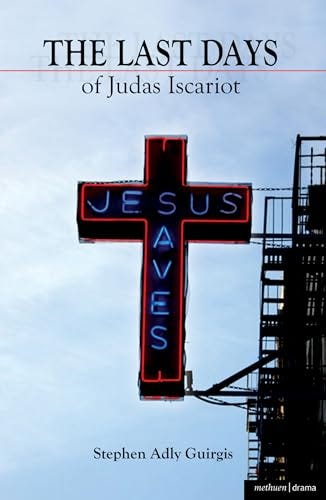Toward an Understanding of Sin
I'm writing this manifesto thing and here's what's coming out
My theology has definite influences from culture, even if those influences may not be particularly pop. I have been probably overly influenced by C. S. Lewis, but much moreso The Screwtape Letters than The Chronicles of Narnia.
In particular my understanding of sin draws heavily from the final scene of Stephen Adly Gurgis’s The Last Days of Judas Iscariot.
Judas is in Purgatory. There has been a whole trial about him, which has collapsed. Everyone else leaves the stage. One of the things we learn about purgatory is that everyone is stuck there not because of outside forces, but because they are stuck in themselves, in their past, they can’t let go and move on. Judas is so stuck that he is catatonic, completely unresponsive to anyone at the trial, anyone in Purgatory.
The others wander off, lost in their own regrets. Judas is left alone onstage. And in contrast to anything I’ve understood about Purgatory (which if memory serves is a non-Scriptural creation of the Catholic Church) Jesus comes to visit him.
(I’m going off memories that are more than a decade old, so Stephen if you read this please forgive me my butcheries.)
It turns out that Jesus has been trying, over and over, to connect with the catatonic Judas. That Jesus would forgive him and welcome him into heaven. Jesus stands there and tells Judas that he loves him, begs him to speak to him, begs them to be reconciled.
And Judas is utterly immobile. It’s not clear that he knows Jesus is there; it’s not clear that he knows anyone is there. He’s so trapped in his own purgatory that he doesn’t even recognize the Purgatory that he’s in.
And the image I remember is Jesus falling silent, putting a hand on Judas’s shoulder, and just standing there, loving his friend, as the lights fall.
And this to me is the image of God’s love. And the basis of my understanding of sin.
I’m a Lutheran, and I’ve been taught that God loves us no matter what. No matter who we are or what we’ve done, God loves us. Just like Jesus loves Judas, despite everything he did.
And that means, to me, that God continually reaches out to us and wants us to be reconciled.
What then stops us?
We do. Sin does.
Sin is that which cuts us off from God.
What cut Judas off from Jesus was his own regret, his stuck-ness, the centering of his own self-loathing.
We are the only thing that can separate ourselves from God’s love. That separation is the definition of sin.
How do we separate ourselves from God’s love?
Vainglory, greed, lust, envy, gluttony, wrath, sloth—all are about putting ourselves first, ignoring context and others and the common good.
We separate ourselves from God through committing sins. Not just the big seven, but all their ripple effects.
And what is Hell except separation from God?
We build our own hells with our separation from love and goodness. And sometimes, like with Judas, what we’ve done hurts so much we don’t even take the steps to repair it, to make it better for ourselves, let alone for others.
It’s not that hell is empty and all the devils are here. It’s that hell is here, when we choose to create it, and we can only leave if we choose to reconcile and repent and rebuild the relationships we’ve broken.
The devil doesn’t consign us to hell. We choose hell when we choose our own selfishness over love and goodness and relationship.


